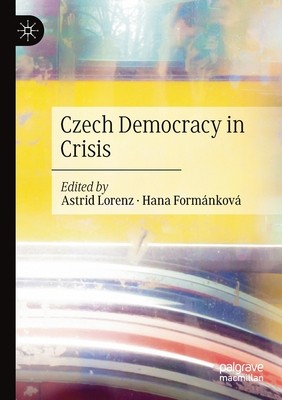
- Išsiųsime per 10–14 d.d.
- Leidėjas: Palgrave Macmillan
- ISBN-10: 3030400085
- ISBN-13: 9783030400088
- Formatas: 14.8 x 21 x 1.6 cm, minkšti viršeliai
- Kalba: Anglų
- Extra -15 % nuolaida šiai knygai su kodu: ENG15
Czech Democracy in Crisis + nemokamas atvežimas! | knygos.lt
Atsiliepimai
Aprašymas
Democracy theories and comparative political science have been challenged within the last decade by an unexpected democratic deficit and the rise of populism in the new EU-member states. This volume written by German and Czech scholars gives some food for thought for solving these research problems by means of thorough analyses of the polity, the politics and selected policies of the Czech Republic since 1990.Dieter Segert, retired Professor of Political Science (Area Studies on Eastern Europe), University of Vienna, AustriaCzech Democracy in Crisis is a long-overdue comprehensive study of the Czech political system. Using institutional approaches to change, it explores crucial policy outcomes. A perfect book for academics and practitioners who want to understand the challenges of democratic consolidation in a new democracy.Lenka Bustikova, Associate Professor of Political Science, Arizona State University, USA, and author of Extreme Reactions: Radical Right Mobilization in Eastern Europe
The image of the Czechs as a poster child of democratization has changed into a crisis narrative in recent years. This edited volume traces this change and examines the suitability of different theories to explain developments in Czech democracy. The contributors, all renowned experts in their fields, offer well-founded and compact insights into the post-1989 Czech political system. They cover political institutions and parties; civil society; the media; and selected policy areas such as foreign, economic, migration and regional policy. The book takes into account processes of democratization and Europeanization, explaining the political picture at various stages of development. Finding that many of today's problems--fragmented political parties, government instability, inefficient state administration and low quality of governance--have not been new developments but have constantly existed, the authors present a plea for theoretical adjustments that should be read by all academics, students, practitioners and readers with an interest in Czech politics and society.
EXTRA 15 % nuolaida
Kupono kodas: ENG15
Akcija baigiasi už 3d.09:26:19
Nuolaidos kodas galioja perkant nuo 10 €. Nuolaidos nesumuojamos.

- Leidėjas: Palgrave Macmillan
- ISBN-10: 3030400085
- ISBN-13: 9783030400088
- Formatas: 14.8 x 21 x 1.6 cm, minkšti viršeliai
- Kalba: Anglų
Czech Democracy in Crisis is a long-overdue comprehensive study of the Czech political system. Using institutional approaches to change, it explores crucial policy outcomes. A perfect book for academics and practitioners who want to understand the challenges of democratic consolidation in a new democracy.Lenka Bustikova, Associate Professor of Political Science, Arizona State University, USA, and author of Extreme Reactions: Radical Right Mobilization in Eastern Europe
The image of the Czechs as a poster child of democratization has changed into a crisis narrative in recent years. This edited volume traces this change and examines the suitability of different theories to explain developments in Czech democracy. The contributors, all renowned experts in their fields, offer well-founded and compact insights into the post-1989 Czech political system. They cover political institutions and parties; civil society; the media; and selected policy areas such as foreign, economic, migration and regional policy. The book takes into account processes of democratization and Europeanization, explaining the political picture at various stages of development. Finding that many of today's problems--fragmented political parties, government instability, inefficient state administration and low quality of governance--have not been new developments but have constantly existed, the authors present a plea for theoretical adjustments that should be read by all academics, students, practitioners and readers with an interest in Czech politics and society.




Atsiliepimai